They’ve finished in the academic top 1% in the nation, and now our Grade 7’s are showing their maturity by demonstrating community spirit during their holidays.
Our Grade 7s recently came third from 68 schools in the district and improved in the national rankings. All students finished with marks of either ‘A’ or ‘B’ in their national exams, qualifying St Jude’s as one of the top primary schools in Tanzania.
Primary school headmaster George Stephen was unsurprisingly thrilled with the outcome.
“I would like to congratulate every one of us (within the primary school) who worked to achieve these good results. Your hard work is appreciated,” he said.
“Let’s continue working towards more performances like this.”
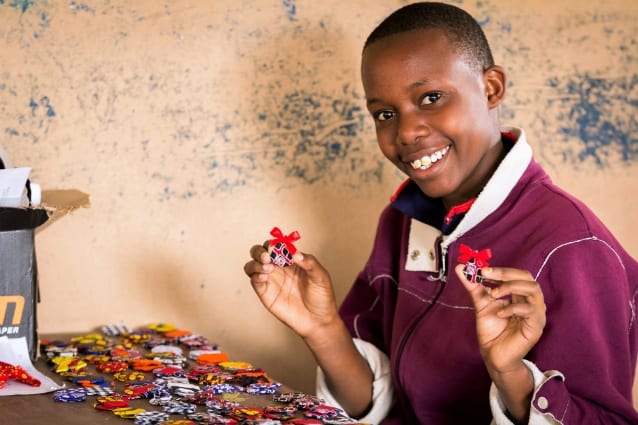
More than 30 of these enthusiastic, soon-to-be primary school graduates have busily spent their end of school-year break volunteering for our school community.
Anethi (Annette) is one such inspirational student. She has chosen to give back by helping to prepare the hundreds of meals our kitchen serves each day, as well as sharing her creative skills in the art room.
“I wanted to help so I just said I would (in both areas),” Anethi explained, adding that she knew she could be an asset in the kitchen as she often helps her mother prepare family meals.
“I help in the (school) kitchen by washing utensils, cutting vegetables and helping serve lunch.”
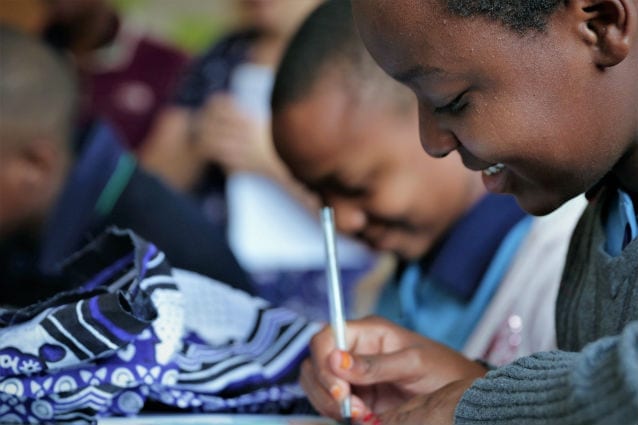
Anethi, along with her friends Nasma, Nasabi, Martha, Elizabeth, Lightness and Brenda, help create Christmas cards and crafty creations for our supporters. Her favourite project has been bottle-top earrings, which Gemma will bring on her tour next year.
“I really like making the earrings and working with my friends on crafts,” she said, singing the praises of Miriam, a St Jude’s Form 6 graduate who is co-ordinating the program.
“She’s good, she helps us lots and it’s fun. I am enjoying it very much.”
Miriam said she has appreciated working with the young students, and enjoyed giving them guidance in both life and their art projects.
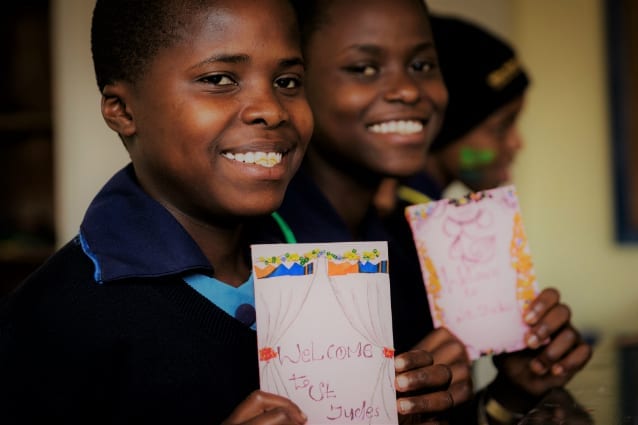
“Originally I was hoping to have 10 students (to help with projects), but the 7 I have are better than 10. They are perfect,” Miriam said.
Miriam said students like shy, smiley Anethi were greatly appreciated for their volunteering, and the Grade 7 group as a whole are high-achieving, excellent examples of student leaders.
Donate to St Jude’s and help us remain in the top 1% for many years to come. Go here to find out how.
St Jude’s is helping address the shortage of women in ICT professions by encouraging our students to gain experience on the World Wide Web.
With laptops in hand and the curiosity to try something new, a group of our female students attended a local college to learn how to build a Wikipedia web page in a special event designed to promote the next generation of female leaders in ICT in Tanzania.
In small teams our students worked together to write a new entry into the encyclopaedia on the internet. Salome was one of the fastest typists in her team.
“We are writing an article about Hotmail,” she said. “I really like writing and seeing my work published online instantly!”
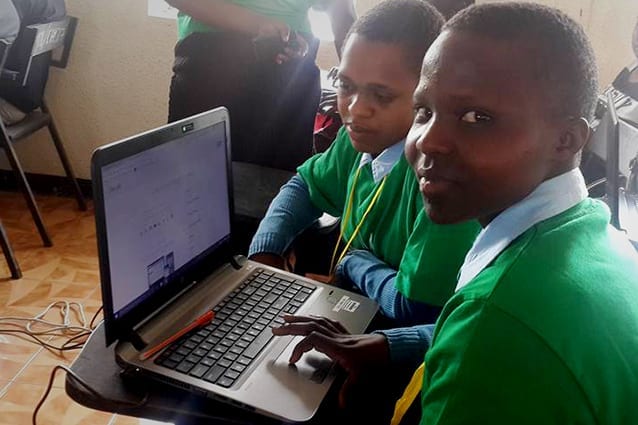
Multilingual Tech Gurus: The students editing a Wiki page in Swahili and English.
The School of St Jude’s Head of ICT, Ernest Mayala, really enjoyed taking students out of the classroom and giving them a glimpse of what their future in education may look like.“I am so impressed,” he said. “Our students have taken part in a real college lecture and are working with maturity and impeccable behaviour.”
Rebecca Ryakitimbo, event facilitator, shares St Jude’s belief that tomorrow’s female leaders are the children of today who just need the skills and confidence to grow. She spoke to students interested in taking up traditionally male subjects at university about her own personal experience of studying a Bachelor’s degree in Electronics and Telecommunications Engineering in Kenya.
“I was the only woman in my whole university class,” she said. “It took a lot of self-belief to tell everyone that this is what I wanted to do. Helping at events like today allows me to spark that confidence in other girls who were just like me.’
Also inspiring our students are Beyond St Jude's CSY interns Winrose and Miriam. It was the first time they had seen our secondary students since they graduated from St Jude’s in May.
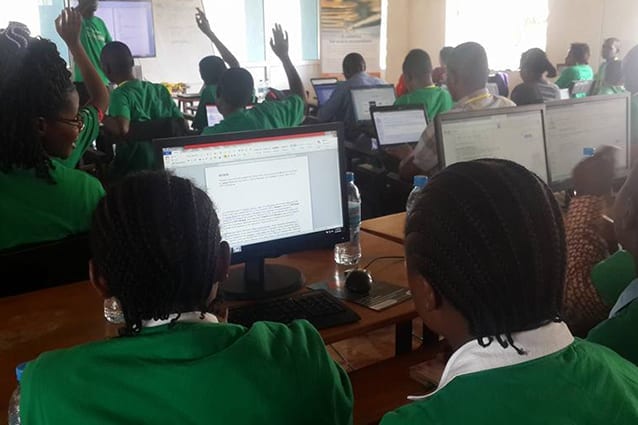
All hands on deck: Our students all participated to make this a successful workshop.
Miriam is now volunteering in our business office, where she is gaining valuable experience working in a professional workplace.“It was so nice to tell the younger students what life is like after you leave school,” she said. “I really enjoy working in a professional office and have learnt so much!”
Australia is beckoning in Winrose’s future as she will be travelling with Gemma next year, spreading the word about St Jude’s. She led a small team writing a Wikipedia article about Wi-Fi.
“St Jude’s really gave me the confidence to think I can achieve anything,” she said. “I like seeing students at events like today shine.”
More than half of our students are women. Donate today to support more future female leaders in ICT and the sciences!
Each year St Jude’s begins the long, difficult but very important task of choosing its newest Grade 1 class. This year, we did things a little differently, inviting the top 10 students from every local government school to come and sit our entrance test.
Gemma said, “This change will better allow us to offer the most deserving students and families the chance at a St Jude’s education and while I wish we could offer every student in Arusha the chance of a scholarship, this just isn’t possible. We felt this change made the whole process fairer.”
The nearly 1,000 students who were invited began to arrive bright and early, armed with their invitation letters, pencils and a determination to succeed. The students first sat a reading test, with those who passed moving onto a written test. The successful students then underwent a documents check to ensure they meet our age and other entry requirements.
Of the nearly 1,000 students who tried only 117 passed this first stage. Those who passed will now undergo our strict poverty assessment. Organised by our Community Relations team, this stage of the process allows us to ensure that every St Jude’s scholarship is gifted to a student whose life will change the most.
We can’t wait to introduce you to the deserving new students early next year when they begin at St Jude’s!
Want to help St Jude's give these students the education they deserve? Donate to Learning Resources today!
From cow dung to insect repellent, industrial waste to bio-gas and plastic bags to building materials; St Jude’s students are applying their first rate scientific education, turning Tanzanian trash into sustainable treasures.
Secondary Headmaster, Nestory Msoffe, was beaming with pride as he inspected over 50 exhibitions from St Jude's students and invited local schools, at the 6th annual St Jude’s Science Day.
“Instead of being content in their circumstances, Science Day gives our students motivation and tools to look for solutions to community challenges and use the resources available to innovate for a better future for our nation,” Mr Msoffe said.
Here's a few examples from the day:
Making plastic fantastic!
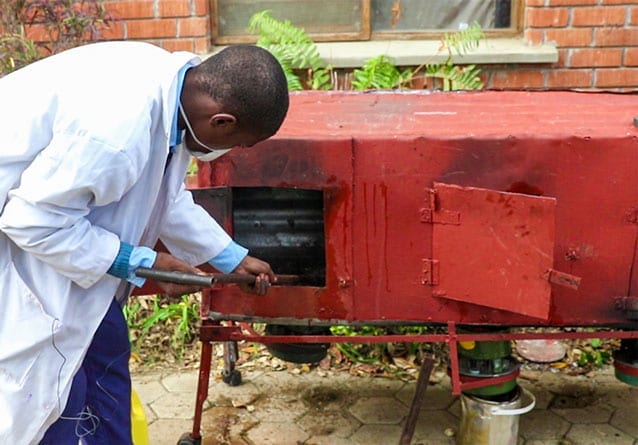
Edgar in Form 3 has been working on his Plastic Recycling project since 2014. He was motivated by the challenges of affordable, durable housing in Tanzania as well as environmental concerns.
“Two years ago, I was in Dar es Salaam and there were terrible floods, most of the people’s houses were mud so they were swept away. They made mud houses because they didn’t have money to construct strong houses.
“Tanzania produces 8 billion plastic bags a year, they end up in the rivers so animals get choked and the bags don’t decompose. You can’t say, ‘stop using plastic bags’, because people have very low income and plastic is cheapest.
“Recycling them is the only way to reduce pollution,” he said.
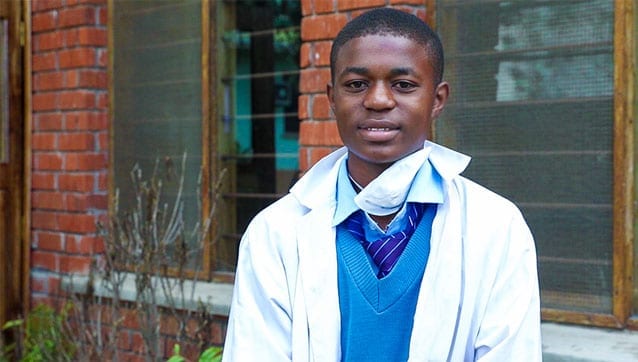
Edgar’s innovation comprises a custom-made metal burner in which he melts plastic bags and combines them with a few other 'secret ingredients' before transferring the mixture into handmade molds to make roof tiles, paving tiles and bricks.
“Tanzania doesn’t produce any roof tiles, most of them are imported from South Africa. If you could recycle plastic bags to make roof tiles, bricks and paving, you could create a whole industry that will give employment to the youth and contribute to development,” Edgar said.
The tenacious teen is still innovating, not content with a first place prize he is looking for materials to incorporate a carbon capture mechanism, of his own design, into the melting machine.
Edgar is also looking to bio-gas options to replace his natural gas burners.
Waste not want not!
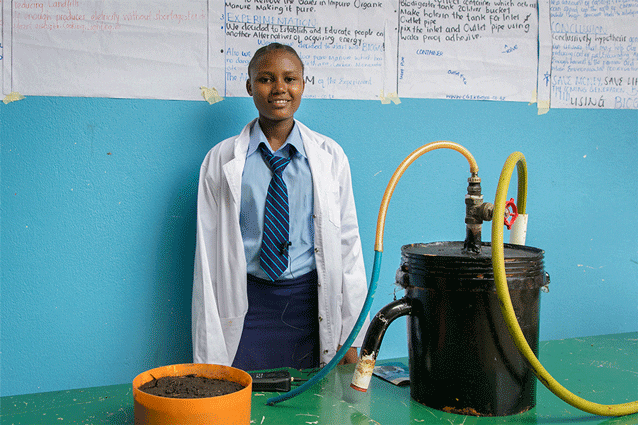
Clara, also in Form 3, took out the prestigious Chairman’s Award for her innovation in sustainable energy sources.
With help from her friends and staff supervisor, Mr Amani, the aspiring medical doctor produced bio-gas using cow dung, bacteria, potassium hydroxide, a handful of buckets and pipes, and some cement for sealing.
“Many gases are produced from the decomposition of cow dung using saprophytic bacteria, the main product is methane, which can be very useful,” Clara said.
“When the gases are combusted, they produce bio-gas and can be connected to a gas cylinder which you can use for heating and cooking purposes and can be compressed to produce electricity.
“By using agricultural waste, municipal waste, green waste, sewage and animal waste to make bio-gas, we can make heating and electricity more available, we can lower pollution and deforestation in our environment and save money,” Clara said.
Household Heroes!
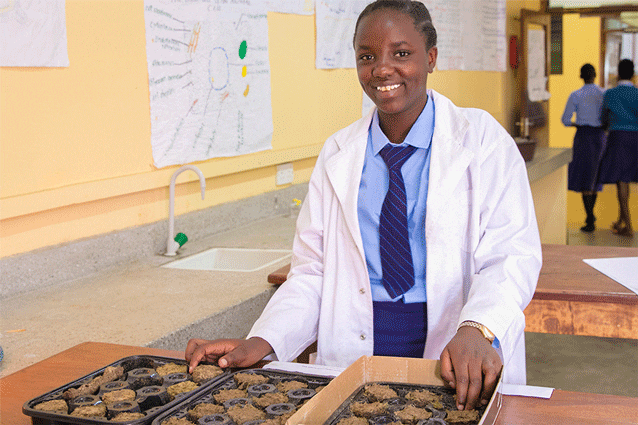
Herbal insect repellent made by Juma, Martin and Kilimba (Form 3) out of cow dung and pine needles. When it is burned it can last for many hours and is much cleaner and cheaper than mosquito coils.
“Mosquito coils are not good for you in small spaces, they are like smoking 137 cigarettes,” Kilimba said.
Organic disinfectant using rice, water and fermented milk bacteria, Aneth and Sesilia (Form 3) produced a low-cost, effective disinfectant with applications as varied as unblocking drains, decomposing waste and treating livestock for disease.
"The mixture must be activated with sugar and with the right ratio of molasses to disinfectant; it can be stored for up to 3 years," Aneth said.
Shoe polish – charcoal, water and glycerin combined to make a nifty, low-cost shoe polish. This entry was submitted by Shepherds School, one of the eight local schools who participated in the day.
Crowd Favourites!
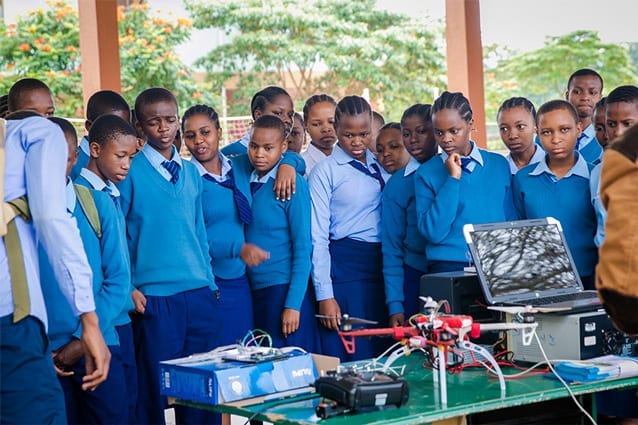
Quadcopter Anti-poaching System - The Kilimanjaro International Institute for Telecommunications exhibited a drone, programmed to monitor national parks and alert authorities to the presence of poachers.
"Thirty elephants are killed in Tanzania’s national parks every week, we need to put an end to this," KIIT staff representative, Lui J Ayo said.
Sensor walking stick - Arusha Technical College displayed a walking stick that vibrates when there is a dip in the ground ahead and beeps when there is an obstacle. Students took turns testing it out all afternoon.
"There are many blind people who need full time assistance, with a tool like this, they will be made much more independent and their helper will be freed up to work and bring in some money," ATC student Samoni said.
When you support St Jude’s, you aren’t just providing free education to the poorest and brightest students in Arusha. You’re supporting almost 300 talented, dedicated staff members committed to fighting poverty in their community.
In our Staff Spotlight series you get the chance to meet these impressive members of the St Jude’s family.
Meet Sebastian – One of our dedicated Social Studies teachers for our upper primary students (History, Geography and Civics) and serving as our Academic Master for Upper Primary. In the Tanzanian curriculum Social Studies covers Geography, History and Civics. Mr Sebastian is also sharing what he has learnt at St Jude’s with local government schools, helping St Jude’s continue to have a wider impact in our community.
In a rare moment of pause during his busy daily schedule, Mr Sebastian Gitbang catches himself by surprise when he thinks about the time that has passed since started at The School of St Jude in 2006.
"It’s almost been 10 years, that’s a long time actually when I think about it,” he says.
“When I joined the school it was not as big as it is now, I feel as if I have grown up with the school.”
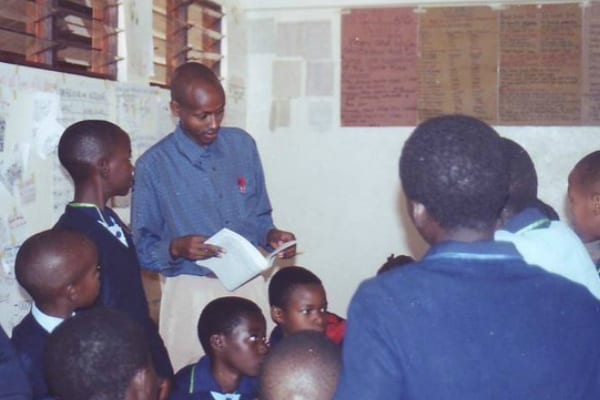
It has been a career that Mr Sebastian could not have predicted when he was hired and asked which classes he would like to teach.
“My first priority was to teach Maths, my second was Science and third was Social Studies. But when I started, I had the chance to join the Social Studies department and I was also given the chance to be the Head of Department. So I took the position, and from then until now I have been teaching Social Studies”.
It is a decision Mr Sebastian has been happy with ever since.
“Social Studies is about life,” he explains.
“It is all about living, human beings and the environment, which is all around us. It helps give our students good and basic skills for their lives. These are the subjects that if you teach the students you are teaching them practical skills. They learn how to live a good life and about things that are important.”
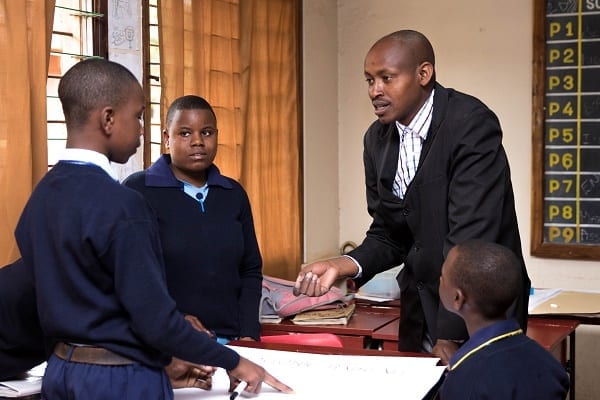
Coming up to nearly a decade at the school, Mr Sebastian is able to think about the small things that have had a lasting impact on the school.
“When I started I was given the chance to come up with new things, like the drumming you see around the school at assembly for the national anthem and other school songs,” he says.
Hundreds of international visitors enter our school gates each year and the lively drumming at assemblies is always one of the highlights.
Mr Sebastian is also having an impact outside of St Jude’s. He has been involved in a community program that offers teacher mentoring and training to local government schools.
“St Jude’s has made me who I am, so I thought I should share the knowledge and the skills I got at St Jude’s with my fellow Tanzanian teachers because they don’t learn what we do here”.
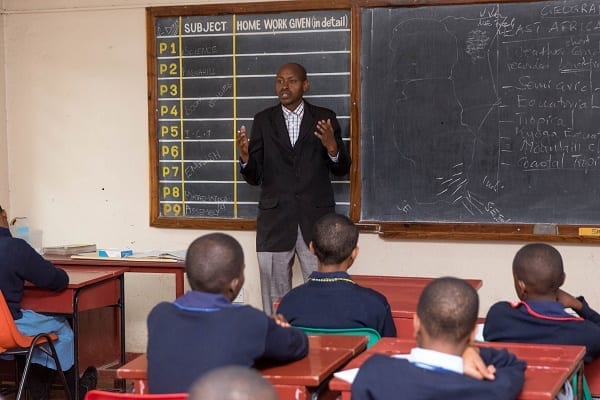
At St Jude’s, we believe that we should facilitate and assist improvements in teaching and learning in Tanzania. In fact this is our eighth strategic goal. Mr Sebastian is helping us achieve this and has been having success, “for the past five years the performance of the Government Schools has improved, compared to the way it was before”.
Mr Sebastian is inspired by Gemma and the St Jude’s community and is proud to have been part of the team and the wider impact on the community. “St Jude’s was just a dream of one person, Gemma, but look at the students who are here. Where would they be if not for her dream? Or the staff where would they be, if not for that dream. It started as just a dream but you can see what an impact it has made and how much our society has benefited”.
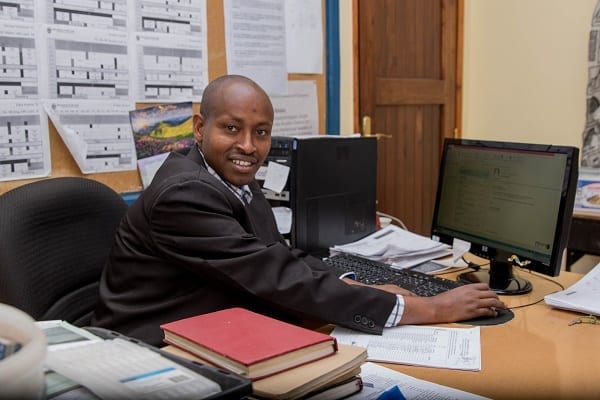
Want to help St Jude’s have qualified, passionate teachers like Mr Sebastian? Donate to teaching today!
Graduate, teacher and future doctor, Dorice is wrapping up her Community Service Year as the sole biology teacher at Sombetini Secondary School.
In 2016, this young leader charmed Australians on tour with Gemma and captured the hearts of her students with her grace and resilience.
We caught up with Dorice to hear about her experience as a teacher.
How are you feeling now that your Community Service Year is coming to an end?
In some ways I feel really good, really excited because I know I am soon going to start another journey in my life. In other ways I feel very sad because of my students. I will really miss them! As you know there is a shortage of teachers and when I leave I don’t know if they are going to have another biology teacher.
What has been the most challenging part of your job?
There is a very big difference, a very huge difference between government school and my education. At St Jude’s we have small classes, few students and enough teachers. We have electricity in classes, computers, and food at every mealtime. Here it is different, the classes have no electricity, and there are too many students – the books are also hard to get.
Most of the students when I came for the first time – they never knew English, so it was very hard. You know biology, it is all in English. Teaching them in English and then translating in Swahili, it was a very difficult thing. The differences now with my students learning in English is huge. Most of them are putting their hands up and speaking so much English.
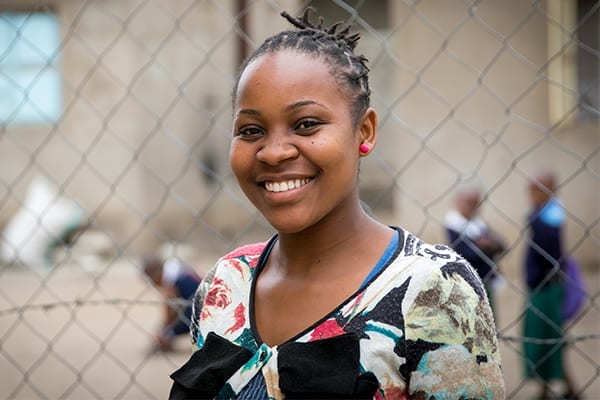
Did you think you could master all this, at the beginning?
For the first time, I was scared. I went home the first day, I told my parents, “I don’t think I can do it”, because it is very hard to be in front of a class of 60 students. My parents they were advising me and giving me hope saying “you can do it”. So I said “OK, I will have to do it and do it will all my heart because I chose it and I want to help these students”. Now I feel so good. I feel so proud of myself!
How do you think this year has changed you as a person?
Actually I feel like I am really grown up now because of dealing with different types of students, different personalities, and other teachers who are much older than me. Now I know I can face different situations and I can make tough decisions. So I feel like I have changed a lot.
I feel I can live and change to any kind of environment. Life in government schools is very hard but I can do it. For example, I can now stay for a long time without eating and still perform my responsibilities, which is a good thing actually.
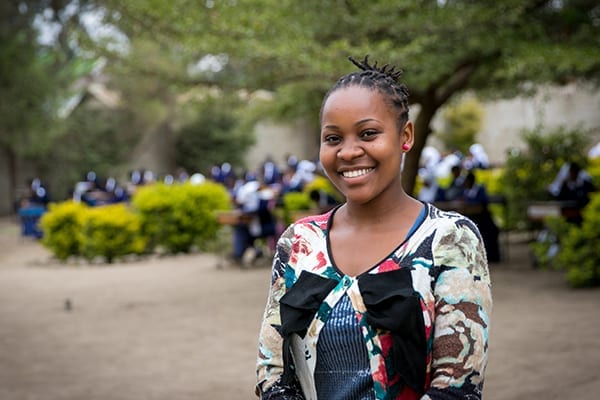
How do your students feel about you leaving for university?
They say how much they will miss me because the way I live with them and treat them is more like a big sister. It’s different with the other teachers. When my students have problems they come and tell me and if I am capable I will always help them. They say when I leave they don’t know how they are going to find some answers in their lives, especially girls, they are more comfortable talking to me.
What is your proudest accomplishment as a teacher?
Now I can see most of my students have a real goal in their life. Last year when I came, I asked my class, “who wants to be doctors?” They were all quiet. “Who wants to be teachers?” They were all quiet. They didn’t understand themselves, what they wanted, or how they could think about their future.
The way I talked to them and advised them over this year I think is why they come to me and tell me, “in university I want to study this” or “in VETA college I want to study this”. So I feel like somehow they have seen what is going on in their lives and how they can have some power in that through education.